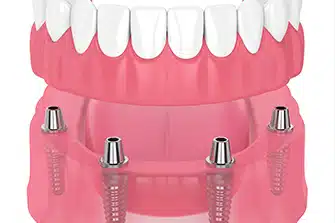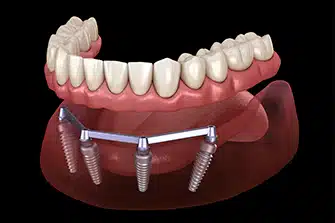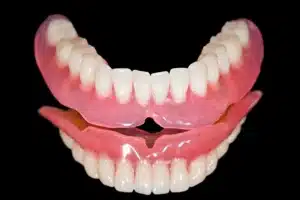When properly cared for, your teeth should last a lifetime. Unfortunately, this isn’t the case for many people. In some cases, there are genetic factors that can cause and/or contribute to tooth loss. On the other hand, some people have poor oral hygiene and lifestyle habits that can cause and/or contribute to tooth loss.
However, regardless of the cause- tooth replacement is critical, especially for patients who are missing most or all of their teeth. Normandale Dental offers a variety of tooth replacement solutions including snap-on-dentures and all-on-4 dental implants.
Both of these options are held in place with dental implants. The primary difference is that all-on-4 dental implants are fixed, while snap-on dentures can be removable. Here is what you need to know about these two hybrid tooth replacement solutions.
What are Snap-on Dentures?
Snap-on dentures are an affordable, stable option for replacing most or all of a full arch of teeth. This option relies on 2 to 4 implants inserted into the jaw. Many times, snap-on dentures are removable- but in some cases, they may be fixed in place.


What is All-on-4 Dental Implants?
All-on-4 dental implants is a tooth replacement system designed to replace an entire arch of missing teeth with only 4 dental implants. The strategic placement of the implants allows for a stronger bite force than other tooth replacement options.
Snap-on Dentures Vs. All-on-4 Dental Implants
Factors to Consider | Snap-on Dentures | All-on-4 Dental Implants |
Installation process | Must undergo oral surgery for implant placement | Must undergo oral surgery for implant placement |
Number of implants required | Uses 2 to 4 (or more) dental implants to support a full arch | Requires 4 implants to support a full arch |
Stability | The removable option is less stable than the fixed because the clips could loosen, increasing the risk of the overdenture falling out | Almost as stable as full-mouth dental implants |
Bone preservation | Jawbone density and health are supported by dental implants | Jawbone density and health are supported by dental implants |
Eating and chewing | Full eating/chewing ability restored with both removable and fixed options | Full eating/chewing ability restored- stronger bite force is possible due to the placement of implants |
Oral hygiene | Removable options must be cared for like conventional dentures, while fixed options must be cared for like natural teeth | Brush and floss prosthetics just like natural teeth |
Long-term durability | Research has proven that implants can last a lifetime with proper care and maintenance. However, since the overdenture must be taken out daily, it may only last for about 15 years. | Implants last a lifetime, while the overdenture may need to be replaced in about 20 years- maybe longer with proper care and maintenance. |
Cost | Average cost of $6,000+, depending on the number of implants and materials used | Approximately $12,000 per arch, $24,000 for full-mouth restoration |
Time for treatment | Dental implants must heal before the prosthetic can be placed- which can take a minimum of several months to a year | The entire process can be completed in one day- however, the prosthetic placed on the day of the implants is temporary- a permanent one will be installed in a few months |
Aesthetics | Fixed overdenture is more natural-looimplking than removable options- but still not as natural looking as single dental implants for each tooth | More natural looking than conventional dentures or other removable options- but not as natural-looking as single dental implants |
Which One is Right for You?
Tooth replacement is a major decision. The gold standard of tooth replacement is dental implants. Unfortunately, many people find that when a full-mouth restoration is required, they may struggle to afford dental implants. However, hybrid solutions such as All-on-4 and snap-on dentures.
All-on-4 offers the best of both worlds: the affordability of conventional dentures combined with the stability of dental implants. Snap-on dentures can be fixed or removable. The disadvantages of the removable options are similar to that of conventional dentures.
When deciding which one is right for you, consider factors such as:
- Appearance
- Care/maintenance
- Food restrictions
- Eating/drinking
- Recovery
Another factor to consider is cost. Many dental insurance providers will cover a portion of treatment, while others will not. There are financing options available for patients who need help paying for their treatment.
Schedule Your Tooth Replacement Consultation with Normandale Dental Today
If you are missing most or all of your teeth in one or both arches, and considering full-mouth restoration, schedule your consultation with the team at Normandale Dental today. Our staff is highly skilled in many treatment areas, including tooth restoration/replacement.
We are located on Hyland Greens Drive in Bloomington. Our office hours are Monday through Thursday from 8:00 AM to 5:00 PM and Friday from 9:00 AM to 4:00 PM. In addition to tooth replacement, Dr. Matha offers a variety of general, cosmetic, and restorative procedures for the entire family.
Tooth Replacement FAQs
If you are missing most or all of your natural teeth, there are a few options for tooth replacement. If you have questions, the team at Normandale Dental will be happy to answer them. Below are some of the most common questions that we’ve gotten about tooth replacement options:
Can you sleep with snap-on dentures?
Are snap-on dentures any good?
Yes, snap-on dentures offer many advantages over conventional dentures. However, that being said, they are not as stable as All-on-4 dental implants or as stable as replacing each tooth with a single implant.
How long do snap-on dentures last?
On average, snap-on dentures last 5 to 10 years- but may last longer with proper care and maintenance.
How to clean all-on-4 dental implants?
When it comes to cleaning all-on-4 dental implants, you should brush and floss like your natural teeth.
How long does it take to get all-on-4 dental implants?
All-on-4 dental implants are often referred to as “teeth in a day”, which means that the prosthetic can be placed on the same day as the dental implants. This helps you avoid having to be without teeth for an extended period of time.
What can you eat after all-on-4 dental implants?
All-on-4 dental implants restore your ability to eat what you want. However, you may want to stick with soft foods for up to 6 months until osseointegration takes place. This is the process of the jawbone healing around and fusing with the implants.
Are all-on-4 dental implants removable?
No, all-on-4 dental implants are fixed in place, so they cannot be removed except by the dentist.
How to floss all-on-4 dental implants?
The best way to floss all-on-4 dental implants is with a water flosser because regular dental floss can damage the implants and prosthetics. Many dental professionals advise that once a day is sufficient. However, you may find it best to floss after every meal.





